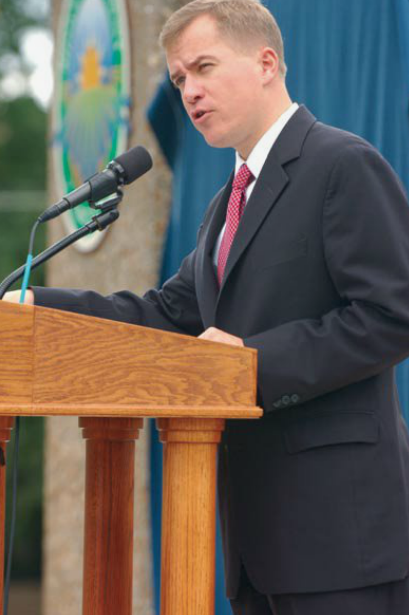
It is hard to believe that it was more than half a century ago that William F. Buckley, Jr. stood “athwart history yelling stop” in a new little magazine of conservative opinion.
Of course, that little magazine, the National Review, and particularly the words in that early article, served as a catalyst for a nascent conversation that would eventually pave the way for Barry Goldwater’s 1964 nomination and then President Reagan’s election nearly two decades after that.
Yet, despite the passage of time, and the importance of President Reagan’s time in office, we seem to have abandoned the lessons they taught us. Primarily, we have forgotten Mr. Buckley’s instruction that:
“[B]ack of all political institutions there are moral and philosophical concepts, implicit or defined. Our political economy and our high-energy industry run on large, general principles, on ideas—not by day-to-day guess work, expedients and improvisations.”
We must show the American people that we live by the conviction that public measures ought to be judged by their prudence. We ought to demand fiscal responsibility and deny the short-term benefits of political advantage or popularity.
Our political adversaries have always disagreed with the power of ideas, preferring instead to point to materialism as the true mover of history. Thus, they continually focus on Republican machinery. The truth is, however, that without those words, and the ideas they represented, there would have been no conservative movement, no Reagan Revolution, no Contract with America, and certainly no Republican machinery.
But that movement and its ideas have not always been the harbingers of Republican success. As author Craig Shirley pointed out, in 1974, just following the Watergate scandal and an administration that had ignored ideas, the Republican National Committee was so depressed about its electoral chances that it began distributing buttons that read, “Republicans are People Too.” By 1976, the GOP could only count 38 Senators, and in the House Democrats outnumbered Republicans by more than a two to one margin. Only a handful of governorships were in Republican control, and the situation in state legislatures was even worse. In sum, the much talked about dream of establishing a permanent Republican majority would have been laughable just 30 years ago.
Fortunately, as we all know, in 1980 Ronald Reagan came to the White House and gave body and force to conservative ideas. Now nearly two decades after he completed his service as President, it is high time that we return to those ideas that he embodied. We must show the American people that we live by the conviction that public measures ought to be judged by their prudence. We ought to demand fiscal responsibility and deny the short-term benefits of political advantage or popularity.
By putting a bold agenda in place in Missouri we have reduced the size of state government, aligned spending with Missouri values, and allowed for innovative investments to protect Missouri’s prosperity for generations to come.
The American people expect and deserve effective leadership from us. Conservatism can offer a bold and effective agenda, one that can bring reform at a time when reform is most needed. The recent state election results in Missouri offer a sharp contrast to the federal results and illustrate just how a bold conservative agenda was able to hold back the tide during a terrible year for Republicans. We experienced only small losses in our General Assembly, and Republicans still command large majorities in both houses. In a difficult year, we even beat incumbent Democrats. Some of our policies help explain why.
When I took office as Governor of Missouri in January, 2005, I faced a billion-dollar funding shortfall for the coming fiscal year. Prior administrations’ tax and spend philosophy had led to several gluttonous spending binges, and voters were left with the credit card bill.
First, I froze all state spending on items such as vehicles, cell phones and new leases and took other common-sense steps like closing the state’s unnecessary Washington D.C. office and eliminating more than 220,000 square feet of wasted office space right here in Missouri. So far, those common–sense steps have saved Missouri taxpayers tens of millions of dollars, and the work continues.
Similarly, after years of rapid growth we acted to reduce the size of state government by partnering with the private sector to reduce cost while improving services and by creating a culture where leaders and managers know that they will be rewarded for reducing size and cost. Missouri state employees now total less than 60,000—the smallest number in eight years— and I am committed to not going above that number during my service as Governor.
I also took aim at waste, fraud and abuse. Social welfare provider fraud was ignored by previous administrations, to the detriment of Missouri’s neediest citizens. Over $120 million that was being wasted is now directed to those who have a real need.
Very early in my administration I also had to face the tough and unpopular task of reining in Missouri’s overextended Medicaid system, which was on the verge of bankrupting the state. Maintaining the status quo would have meant sacrificing public education and proposing harmful tax increases. Instead, I called for tightened eligibility requirements and some co-payments. I also proposed the Department of Social Services annually review the eligibility of each Medicaid recipient. These measures have not only saved us millions of dollars, but they have also ensured that the Missourians who most need services are the ones receiving them.
I also realized that we must develop a new system to better deliver healthcare to low income Missourians. In the upcoming legislative session I will introduce major reform proposals to change our Medicaid system.
By reducing spending and focusing on priorities, I have been able to invest in our future. For instance, we have been able to increase funding for education by more than $331.8 million and higher education institutions have received an additional $20 million.
I believe Missourians pay enough taxes, and I have worked to return structural balance to our budget and ensure we live within our means without increasing the tax burden on Missouri’s hard working families.
By putting a bold agenda in place in Missouri we have reduced the size of state government, aligned spending with Missouri values, and allowed for innovative investments to protect Missouri’s prosperity for generations to come. Moving this bold agenda forward has brought significant challenges, but it is worth it because it is consistent with the principles that have guided our party in its greatest moments.
Matt Blunt is the Governor of Missouri. In October 2006, he became the only Governor in the Nation to earn an “A” in the CATO Institute’s annual fiscal policy report card of the 50 states.




